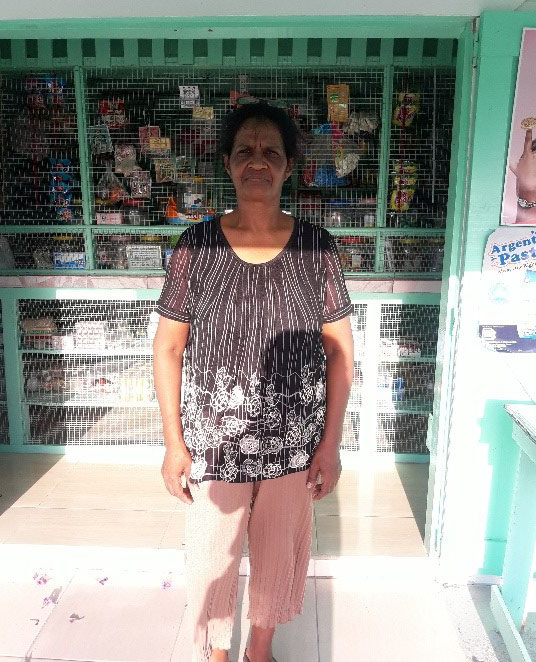Hers is a perfectly ordinary story. She was raised in poverty. As far as formal education was concerned she went no further than Cove and John Primary School before going to work on a small farm at Nooten Zuil, on the East Coast Demerara owned by her grandparents. With the passing of her grandparents she decided that farming was not her calling. In 2003 she ploughed the savings that they had left her into a Convenience Store in the lower flat of her home. Her uncle, she says, ‘chipped in’ to help her realize the venture. Hers was one of those shops whose offerings coincided closely with what she believed to be the essentials of the community: milk, butter, eggs, aerated drinks, washing detergents, cleaning supplies, rags, sponges and paper towels and other ‘life-sustaining’ necessities. Mindful of the growing numbers of children in the community she also offered an array of the local Chico brand of sweets.
Nooten Zuil is populated largely by Indo Guyanese.
Lying contiguous to that village is the predominantly African Guyanese village of Belfield which also represents a market for Auntie Annie. Unwittingly, perhaps, but with a fair measure of success, her establishment has played a role in ‘managing’ relations between the two communities offering a service that responds to their common material needs.

While there are several examples across Guyana of communities ‘separated’ by race that have succeeded in bridging that gap, the challenge still remains to be completely met though the role of Auntie Annie’s place of business is one in which there is a semblance of a positive impact.
Her business is something of a ‘melting pot, catering to the demands of groups divided by villages that have no boundaries. The particular demands of her customers has caused her to both increase her stock of items like soaps, deodorants, school supplies and baby products, all these being a common need across the communities. But she has gone further, ensuring that the shop is stocked with goods that respond to particular ethnic fashion preferences.
More recently, Aunt Annie went further. Using the profit that she was making from the shop she invested in a Pool Table, immediately adding a younger dimension to her customer range. Unsurprisingly, patronage among the young men and women from both villages increased thereafter.
Romeo Machado, who resides in the southern half of Nooten Zuil says that he goes to the shop on weekends to “chill with some of my friends, or sometimes after stressful day to shoot some Pool and relax”. Serika Tekchan, another Nooten Zuil resident says that she too “hangs out” at Aunty Annie’s Shop. “It is a regular thing for me to come and hang out at the shop, I come here every day” Aunty Annie’s is where she pursues her routine shopping needs as well.
African Guyanese residing in Belfield too have come to rely on Aunty Annie’s for many of their short-term needs.
My engagement with Aunty Annie and a handful of her customers was, in its own right, an interesting experience. If there is no lack of awareness of cultural differences across ethnic lines, there is, as well, an understanding that both communities have common needs and that there is much to be gained from access to ‘spaces’ that provide for those needs.
Aunty Annie may be no deeply contemplative social scientist but she has, in her own particular way, embraced her own formula (which is far from unique) for responding to the common needs of the two largest race groups in our country.
During a brief ‘gaff’ with Aunty Annie and a handful of her customers the reality of what her convenience store and her Pool Table have accomplished in eroding what otherwise might well have been strong, perhaps even acrimonious ethnic barriers, was acknowledged. Groups of residents, including youngsters, from both villages, gathered in front of her business premises, conversing or otherwise entertaining themselves in the night air are reassuring in a wider environment where, all too often, tensions are not too far away.
If there is an element of uncertainty that hangs over the continuity of this welcome example of positive communication across ethnic lines, there is, as well, concern, that facilitators of that condition like Aunty Annie’s small convenience store may well be threatened by the increasing advance of Chinese businesses spreading rapidly across coastal Guyana and venturing into villages which, up until recently, had boasted no business house beyond the magnitude of what is commonly known in Guyana as a ‘Cake Shop.’ Aunty Annie admits to being concerned. She is only too well aware that recently, a small variety store much like hers, located in Cove and John was forced to give way to a much larger Chinese Supermarket, after being in business for more than twenty years. She is under no illusions about the likelihood that that could be the fate of her own establishment as well though she is beginning to better understand the significance of the particular role that her own small enterprise is playing.
(Naiomi Parris)










